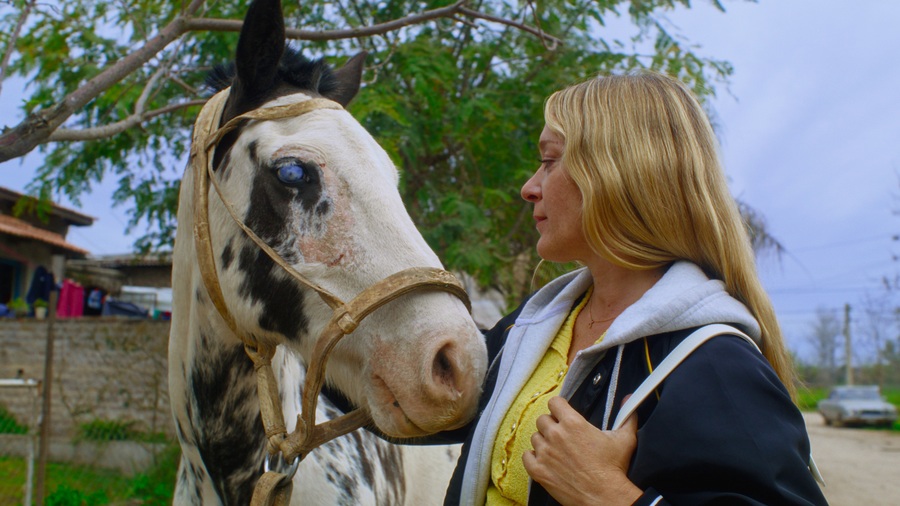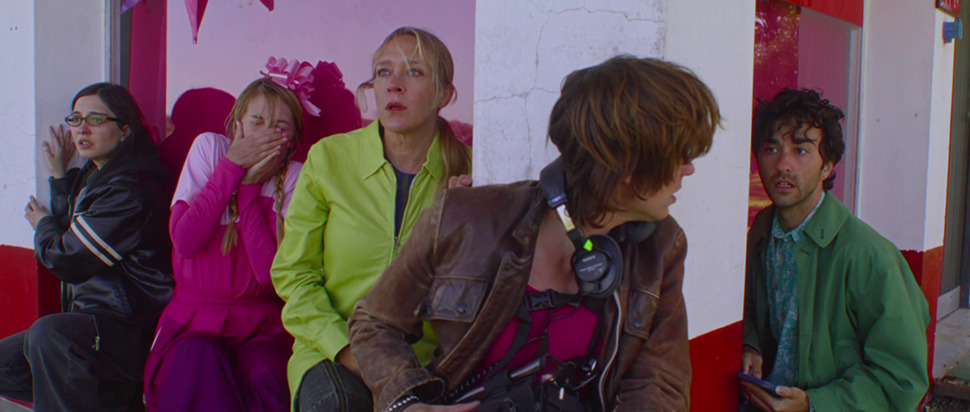Amalia Ulman on Magic Farm
Amalia Ulman’s visually striking culture clash comedy Magic Farm follows some inept journalists trying to make a film in a rural Argentine town. The artist and filmmaker discusses working with her idol (Chloë Sevigny) and finding beauty everywhere
Amalia Ulman is telling me about soy. The bright, vivid green of that bean crop being destroyed by glyphosates was the first visual image that came to her when creating her latest film, Magic Farm. She’s a visual thinker, she tells me, not wordy like Woody Allen or Hal Hartley, “whose scripts could be like a book,” she laughs.
So, these fields of transgenic soy, “which have a very particular look because they're usually very green, against blue skies. It already gives you a very vibrant colour scheme,” like the Microsoft screensaver, I suggest. She laughs, “Yes! And it’s from the 90s,” like many of her other inspirations. So Magic Farm is like if Microsoft Windows, Gen X music promos, Chris Cunningham and Bam Margera's skateboarding videos had a baby, basically. And her sophomore feature does feel like a loose, zany throwback to 90s video art that doesn’t exist anymore. When “people were splurging. Those years were really expensive,” she says of filmmaking in the 90s. “There's not that kind of money anymore… Back then, people would spend millions of dollars on music videos, with good directors. Like the Fatboy Slim videos, like the Michel Gondry videos…”
Ulman’s work is up there with her icons. From Argentina, she grew up in Spain, studied in London and now resides in New York. She’s multi-talented, having written, produced and acted in Magic Farm opposite her idol Chloë Sevigny (which she describes as “Terrifying!”).
Just like her first film, El Planeta from 2021, Ulman also did most of the pre-production – location scouting, writing the script – on her own, which suits her just fine. “I’m less drained if I do it alone. That's one thing my autism gives me... I hate calling it a superpower,” she smiles. “What happens is I can do all this really intensive work on my own that most people would find stressful, but then I suffer with other things that are more social.”

Chloë Sevigny in Magic Farm. Image courtesy of MUBI.
Ulman has brought together a pair of Hollywood's coolest stars (Alex Wolff and Chloë Sevigny play Jeff and Edna, two hip, dumb American journalists/tourists) with lesser-known Argentinian actors. The latter play the warm, eccentric and lovable locals – and they're the heart of the film. The hipster journalists meet them while trying to make their documentary in rural Argentina. Of course, everything goes wrong: the "journalists" (in the vein of Vice) are wholly unprepared and under-researched, and a series of sardonic vignettes show how their mistakes stem from their own self-absorption. Ulman has a keen eye for dry humour (I wrote down many of the hilarious lines, like how Jeff compares synced menstrual cycles to like when “fruit is together in the bowl and rots faster”, or when Edna tells Jeff, “You should stop taking so much ketamine. You’re not a pony”).
I’ve never seen a film quite like Magic Farm. It's as if Hunter S Thompson had a wacky, gonzo baby with a Zoomer. Or think Nathan Barley for the post-Vice, post-'08 recession, influencer/ketamine/TikTok gen, for whom 34 is still young and exploiting people is a valid part of a job – grown-up, even! Colours are vivid, like an Instagram filter. The tone of the film is not one of cynicism, however. Ulman is a sincere artist, and she believes the arts are in trouble; the type of content-farming, clickbait culture she's satirising in Magic Farm is troubling to her.
"Right now, I feel like there's a lot of, like, fear,” she says. “We don't want to spend any money on anything that is not crucial, and that primes a whole generation to not think art is important, and then that makes you more insecure about making something daring. I'm always excited because I think talent is everywhere. But what's sad, too, which wasn't the case with the early internet, is that now we're relying on likes more than ever. Popular doesn't necessarily mean good.”
But despite this, Ulman is still hopeful for what art can do now – its possibilities. When I ask her what she wants audiences to take away from a viewing of Magic Farm, she offers a sincere and profound answer: “To know that there's beauty everywhere. That there’s smarts and intelligence everywhere. Don't underestimate people because of where they're from. I think that's something that I find very upsetting when films are made about either, you know, people with disabilities or people from poor backgrounds or whatever. And usually they're directed by people from the upper classes, and there's this sense of guilt and everyone's so humble and subdued... It's like, No! People from all backgrounds can be funny, creative, weird, bad. They can be everything! That's something I try to reflect in my films.”
Magic Farm is released 16 May by MUBI
